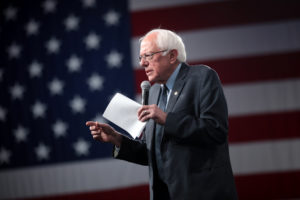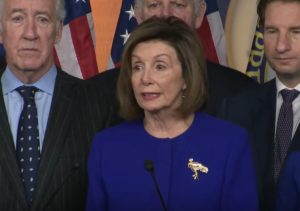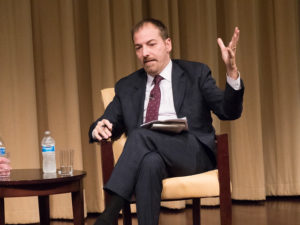‘Right-to-Work’ Battle Lines Drawn in Key Missouri Vote
Labor's clout is being put to a critical test in Tuesday's referendum over whether the state should ban compulsory union fees in all private-sector workplaces.JEFFERSON CITY, Mo.—On the heels of a U.S. Supreme Court ruling weakening public-sector unions, labor’s clout is being put to a new test by a referendum in Missouri over whether the state should ban compulsory union fees in all private-sector workplaces.
The statewide vote in Tuesday’s primary on a so-called right-to-work law could be a watershed moment for unions, if they can halt what has been a steady erosion of strength in states with historically deep-rooted support.
“The timing of this is essential. I think everyone wants to write the labor movement’s obituary,” national AFL-CIO secretary-treasurer Liz Shuler said. But “it’s going to energize and activate us and show that we fight back.”
If they lose that fight, Missouri will become the 28th state with a law that prohibits labor groups and employers from forcing workers to pay mandatory union fees.
The so-called “fair share fees,” which are less than full dues, are intended to cover unions’ nonpolitical costs such as collective bargaining because federal law requires unions to represent even employees who don’t join. Eliminating those fees is expected to reduce unions’ overall finances and potentially their influence.
That’s one reason why unions from across country are engaged in Tuesday’s vote. Heading into the final week of campaigning, a labor-led group already had spent over $15 million against Proposition A, outspending supporters by a more than 3-to-1 ratio.
The issue has become highly partisan in recent years.
Most state right-to-work laws were enacted shortly after they were permitted by the 1947 federal Taft-Hartley Act. But there’s been a recent surge of such laws as Republicans have strengthened their hold on state governments, starting with an Indiana law in 2012 and followed by ones in Michigan, Wisconsin, West Virginia and Kentucky.
Labor unions typically support Democratic candidates. In states where they remain strong, such as California, they sometimes are seen as having undue influence over Democratic lawmakers and governors.
Missouri’s Republican-led legislature and governor enacted a right-to-work law in 2017, but it never took effect because unions gathered enough petition signatures to force a referendum — essentially giving voters a chance to veto it.
The vote originally was planned for November but was switched by GOP lawmakers to the August primary in a maneuver that prevented an anticipated heavy union turnout from coinciding with Republican efforts to unseat Democratic U.S. Sen. Claire McCaskill.
Tuesday’s vote comes amid uncertainty about the future of organized labor in the U.S. In late June, the U.S. Supreme Court ruled that an Illinois state government worker could not be forced to pay collective bargaining fees to a union, essentially establishing a right-to-work policy for public-sector workers in all states.
That decision turned the spotlight to Missouri as the first place where voters subsequently will decide whether to enact a similar ban for private-sector unions.
“It’s the next battle, if you will, in this ongoing fight to end compulsory unionism in America,” said Mark Mix, president of the National Right to Work Committee, which backed the Illinois lawsuit.
As of late July, the National Right to Work Committee had spent about $2.2 million on behalf of Missouri’s ballot measure, nearly half the total amount spent by supporters.
Proponents and opponents have combined to spend more than $20 million on Proposition A, even though union members comprised just 8.7 percent of Missouri’s workforce last year and 10.7 percent nationally. Missouri’s private-sector unionization rate of 7.5 percent was a percentage point higher than the national average.
Many of Missouri’s top unionized employers — including The Boeing Co. and Ford Motor Co. — have taken no position on Proposition A. But unions that represent their employees have helped canvass neighborhoods, put up yard signs and make phone calls in opposition to it.
“Prop A is nothing but a tool for the large corporations to be able to take away the power of the unions to negotiate fair, respectful wages,” said Stephen McDerman, president of the International Association of Machinists and Aerospace Workers District 837, which represents many Boeing employees.
K&S Wire Products Inc., a non-union manufacturer that employs about 110 people in Neosho, in the state’s southwest corner, is one of the few businesses to directly contribute to the campaign for the ballot measure.
“If you treat your employees right, just like if you treat your children right, they don’t need to go find somebody else to represent them as mommy and daddy,” said K&S President Gene Schwartz, whose company gave $7,500 to Missourians for Freedom to Work.
The advertising campaigns for and against the referendum have generally focused on economics, with supporters claiming that right-to-work policies lead to more jobs and opponents claiming they drive down wages.
Studies have found mixed and sometimes conflicting results.
The Washington-based Economic Policy Institute, which opposes right-to-work, found that wages in right-to-work states average 3.1 percent less than elsewhere after accounting for other workforce differences such educational backgrounds, racial composition, the industrial makeup of employers and the cost of living. For someone earning $40,000 annually, that would mean $1,240 less per year.
“By deliberately creating a ‘free-rider’ problem for unions, right-to-work starves unions and thus starves their ability to boost wages for workers,” said Heidi Shierholz, the institute’s senior economist and policy director.
A study by economists Ozkan Eren of Louisiana State University and Serkan Ozbeklik of Claremont McKenna College in California used data from states with similar characteristics to analyze the effect of right-to-work in Oklahoma. It was the last state to adopt such a law by a statewide ballot measure, in 2001.
The researchers found the law resulted in a significant reduction in private-sector unionization rates but had no short-term effect on either the total unemployment rate or average private-sector wages.
The study noted that Oklahoma had comparatively low unionization rates even before right-to-work.
Nationwide union membership rates have been steadily falling for decades and are now less than half what they were in 1978, when Missouri voters last defeated a right-to-work proposal.
If unions help defeat it again, Missouri Chamber of Commerce and Industry President Dan Mehan said supporters simply would “come back and reload on it when the time is right.”
But labor leaders hope Missouri will become “like a wall” that reverses the direction of the right-to-work movement. Shuler, the AFL-CIO secretary-treasurer, said unions have been discussing the potential of launching ballot initiatives in other states to repeal existing right-to-work laws.
“We should use that opportunity to actually get out of this crouch — or the defensive posture — and go on offense,” she said.
Your support matters…Independent journalism is under threat and overshadowed by heavily funded mainstream media.
You can help level the playing field. Become a member.
Your tax-deductible contribution keeps us digging beneath the headlines to give you thought-provoking, investigative reporting and analysis that unearths what's really happening- without compromise.
Give today to support our courageous, independent journalists.









You need to be a supporter to comment.
There are currently no responses to this article.
Be the first to respond.